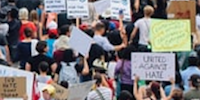|
 |
William Ury explains how Nelson Mandela was a consummate third sider. |
 |
William Ury tells how he managed to build trust with the leaders in Venezuela and through shuttle diplomacy and focusing on their interests got them working together to prevent violence. |
 |
William Ury described how, with help from key outside people, all levels of society have become engaged in the effort to prevent massive violence in Venezuela. |
 |
Stephen Thom discusses a case in which he guided a school principal through a student empowerment process over the phone. |
 |
Former Community Relations Service Mediator Nancy Ferrell describes how she dealt with potentially violent situations. |
 |
Mediator Richard Salem describes how he de-escalated a potentially violent confrontation at the Wounded Knee take-over. |
 |
Mediator Julian Klugman describes how he handles violent or potentially violent situations. |
 |
Former Community Relations Service Mediator Edward Howden describes how he got control of a very uncontrolled mediation process. |
 |
Former Community Relations Service Mediator Manuel Salinas describes how he used caucuses to de-fuse a situation. |
 |
Mediator Ozell Sutton uses humor to de-escalate a situation, though resolution remained elusive. |
 |
Community Relations Service Mediator Ozell Sutton describes the difference between "street mediation" and "table mediation" and how he got and kept people involved in each in a very hostile employment dispute. |
 |
Community Relations Service Mediator Stephen Thom describes how works with the parties to help them communicate their concerns effectively. |
 |
Former Community Relations Service Mediator Wallace Warfield discusses how he balances his mediation activities with justice concerns. |
 |
Former Community Relations Service Mediator Edward Howden describes how mediators sometimes need to be assertive to hold the process together. |










